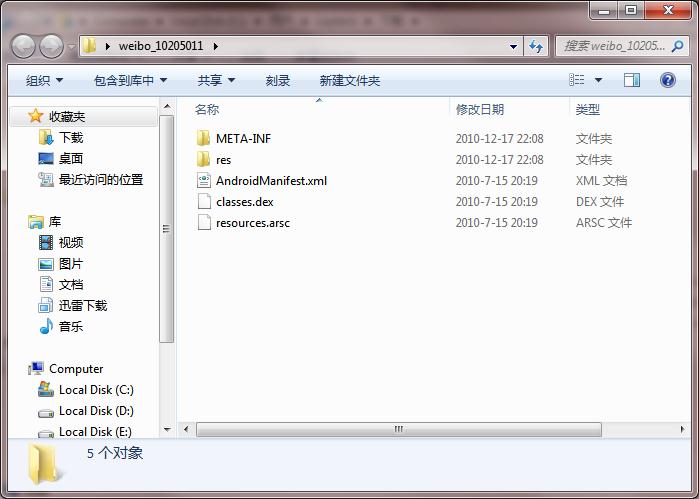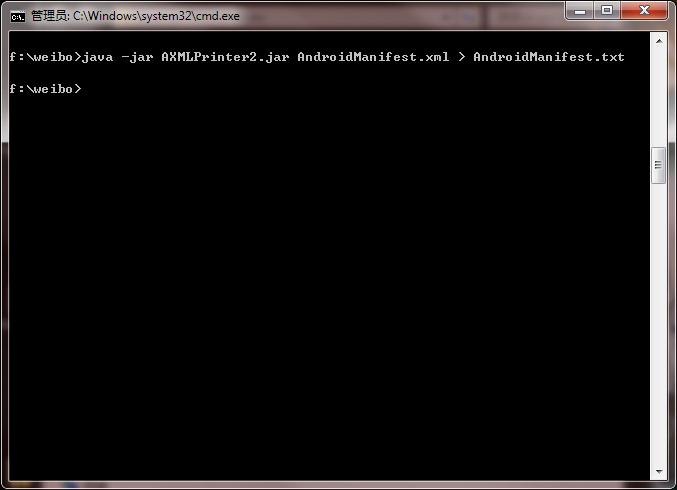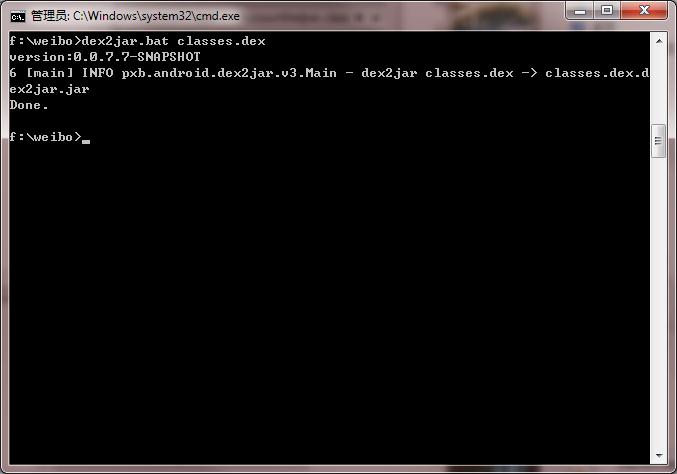学习也要借鉴,最近在学习Android,想看一下市面上大的Android应用是怎么个构架的,所以学习了下Android反编译的相关知识,网上有很多种做法,下面的是我在几种方案中觉得效果最好的方案介绍一下:
(事先声明本文仅供学习之用,若存在任何侵权马上删除)
?
首先Android的apk包也是可以解压的,把它改成后缀RAR的就能直接用RAR解压了,得到的文件如下图:

其中res为资源文件夹,而下面的AndroidManifest.xml和classes.dex则是我们这次反编译的重点。
?
AndroidManifest.xml也被编译过了。。。哎。。这编译连XML文件都没放过,而classes.dex就是Android的Jar包的复刻版了,现在要分两步走:
?
一、xml方面
?
市面上也有好多反编译方法,经我实践用AXMLPrinter2.jar(http://android4me.googlecode.com/files/AXMLPrinter2.jar)反编译出来的XML文件最清晰。
?
命令:java -jar AXMLPrinter2.jar AndroidManifest.xml > AndroidManifest.txt
?

?
代码片段如下:
<manifest xmlns:android="http://schemas.android.com/apk/res/android" android:versionCode="22" android:versionName="2.0.2" package="com.sina.weibo" > <application android:label="@7F090012" android:icon="@7F020059" android:name="WeiboApplication" > <activity android:label="@7F090012" android:name=".MainTabActivity" android:launchMode="2" android:configChanges="0x000000A0" android:windowSoftInputMode="0x00000020" > <intent-filter > <action android:name="android.intent.action.MAIN" > </action> <category android:name="android.intent.category.LAUNCHER" > </category> </intent-filter> <intent-filter > <action android:name="android.intent.action.VIEW" > </action> <category android:name="android.intent.category.DEFAULT" > </category> <category android:name="android.intent.category.BROWSABLE" > </category> <data android:scheme="sinaweibo" android:host="blog" > </data> </intent-filter> ...?
还是蛮清楚的吧!
?
下面是要反编译Jar包了。
?
二、dex反编译
?
由于dex文件是jar包的复刻版,所以可以导出jar包,导出工具是dex2jar(http://dex2jar.googlecode.com/files/dex2jar-0.0.7.7-SNAPSHOT.zip)
?
像上面差不多的在cmd里键入
?
命令:dex2jar.bat classes.dex

?
可以看到在文件夹里出现了一个classes.dex.dex2jar.jar这个jar包
?
接下来就可以看jar包的工具直接打开了,这里推荐一款jd-GUI的查看软件(http://java.decompiler.free.fr/jd-gui/downloads/jd-gui-0.3.3.windows.zip)。
下面是效果:
?
?
package com.sina.weibo;
import android.text.Editable;
import android.text.TextWatcher;
import android.widget.Button;
import android.widget.EditText;
import android.widget.TextView;
import dalvik.annotation.EnclosingMethod;
@EnclosingMethod
class CommentBlog$1
implements TextWatcher
{
public void afterTextChanged(Editable paramEditable)
{
}
public void beforeTextChanged(CharSequence paramCharSequence, int paramInt1, int paramInt2, int paramInt3)
{
}
public void onTextChanged(CharSequence paramCharSequence, int paramInt1, int paramInt2, int paramInt3)
{
int i = this.this$0.mEtBlog.getText().toString().length();
String str1;
if (i <= 140)
{
i = 140 - i;
str1 = this.this$0.getString(2131296400);
this.this$0.mTvInputNumText.setTextColor(-16777216);
if (!this.this$0.mBtSend.isEnabled())
this.this$0.mBtSend.setEnabled(1);
}
while (true)
{
TextView localTextView = this.this$0.mTvInputNumText;
String str2 = String.valueOf(str1);
String str3 = str2 + i;
localTextView.setText(str3);
return;
i += -140;
str1 = this.this$0.getString(2131296401);
this.this$0.mTvInputNumText.setTextColor(-65536);
if (!this.this$0.mBtSend.isEnabled())
continue;
this.this$0.mBtSend.setEnabled(0);
}
}
}
?效果还不错吧,可以好好看一阵子了。
?
仅供学习哈~~